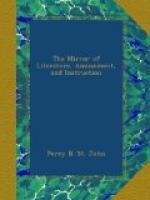The character of Charlemagne can alone be appreciated by comparing it with the barbarism of the times from which he emerged; nor do his virtues or his talents acquire any fictitious grandeur from opposition with objects around; for, though “the ruins of Palmyra derive a casual splendour from the nakedness of the surrounding desert,"[9] his excellence lay not alone in adorning, but in cultivating the waste. His military successes were prepared by the wars and victories both of Pepin and Charles Martel; but one proof of the vast comprehensiveness of his mind, is to be found in the immense undertakings which he accomplished with the same means which two great monarchs had employed on very inferior enterprises. The dazzling rapidity with which each individual expedition was executed, was perhaps less wonderful, than the clear precision with which each was designed, and the continuous, persevering, unconquerable determination wherewith each general plan was pursued to its close. The materials for his wars,—the brave, the active, and the hardy soldiers,—had been formed by his father and by nature; but when those troops were to be led through desert and unknown countries, into which Pepin had never dreamed of penetrating, and in an age when geography was hardly known—when they were to be supplied at a distance from all their resources, in a land where roads were unheard of, and provisions too scanty for the inhabitants themselves—the success was attributable to Charlemagne, and the honour is his due. His predecessors had contented themselves with leading an army at once against the point they intended to assail, or against the host they proposed to combat; but Charlemagne was the first in modern Europe who introduced the great improvement in the art of war, of pouring large bodies of men, by different roads, into the hostile country; of teaching them to co-operate, though separate, to concentrate when required; and of combining their efforts and their movements for a general purpose on a preconcerted plan.
[9] Gibbon makes this observation in depreciation of the character of Charlemagne, forgetting or concealing that the great beauty of the French monarch’s character appeared not from a contrast with surrounding barbarism, but from his efforts to do away that barbarism itself.
His great success in civilization was all his own. Nothing had been done by those who went before—scarcely a germ—scarcely a seed had been left him. He took possession of a kingdom torn by factions, surrounded by enemies, desolated by long wars, disorganized by intestine strife, and as profoundly ignorant as the absence of all letters could make it. By the continual and indefatigable exertion of mental and corporeal powers, such as probably were never united but in himself, he restored order and harmony, brought back internal tranquillity, secured individual safety, raised up sciences and arts; and so convinced a barbarous nation of the excellence of his own ameliorating spirit, that on their consent and approbation he founded all his efforts, and sought no support in his mighty undertaking, but the love and confidence of his people.




